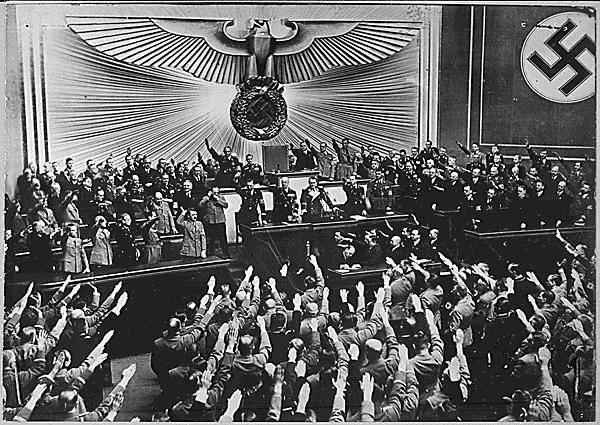
Reichstag
January 30, 1937
Caution: Adolf Hitler was completely wrong about absolutely everything...usually. When Hitler said something that was actually correct, it was merely to set up the next lie. As with all good propagandists—and he certainly was that—he would begin with a few obvious, documented facts, and then proceed to distort them horribly. At any rate, the infamous German Führer’s worm-tongue rhetoric is NOT to be taken seriously, except as a classic example of the sort of masterful demagoguery from which appropriate lessons may hopefully be learned.As always, read with an abundant degree of cautious skepticism.
MEN! Deputies of the German Reichstag! The Reichstag has met today on a day momentous for the German people. Four years have passed since the greatest national revolution and reformation that Germany has ever experienced began. These were the four years which I asked for as a trial period. I do not know whether there has ever been such a thorough revolution as ours, which nevertheless left unmolested numerous former political functionaries and allowed them to work in peace and paid pensions to its bitterest enemies.
But our policy has not been of much use to us as far as other countries are concerned. Only a few months ago honorable British citizens felt they must make a protest to us for detaining in a concentration camp one of the most criminal subjects of Moscow. [Presumably Herr von Ossietzky, winner of the Nobel Peace Prize.] I do not know whether these honorable men have also protested against the slaying and burning of tens of thousands of men, women, and children in Spain. We are assured that the number of people slain in Spain is 170,000. On this basis we would have had the right to murder 400,000 to 500,000 people in the Nazi Revolution!
The National Socialist program replaces the liberalistic conception of the individual by the conception of a people bound by their blood to the soil. Of all the tasks with which we are confronted, it is the grandest and most sacred task of man to preserve his race. This will not lead to an estrangement of the nations; on the contrary, it will lead for the first time to a mutual understanding. It will also prevent the Jewish people from trying to disintegrate and dominate other people under the mask of an innocent bourgeoisie.
Within a few weeks the social prejudices of a thousand years were swept away. So great was the Revolution that its spiritual foundations have not been understood even today by a superficial world. They speak of democracies and dictatorships, and have not realized that in this country a Revolution has taken place that can be described as democratic in the highest sense of the word. Does a more glorious socialism or a truer democracy exist than that which enables any German boy to find his way to the head of the nation? The purpose of the Revolution was not to deprive a privileged class of its rights, but to raise a class without rights to equality.
There is now only one representative of German sovereignty - the people itself.
The will of the people finds its expression in the Party as its political organization.
Therefore there is only one legislative body.
There is only one executive authority.
Therefore the people is the basis, and Party, State, Army, industry, justice, etc., are only the means of maintaining the people.
In a new penal code, justice will be put for all time into the service of maintaining the German race.
When I took over power there were more than 6,000,000 unemployed and the farmers seemed doomed to decay. Today you-must admit that I have fulfilled my promises ...
The Four-Year Plan will give permanent employment to those workmen who are now being released from the armament industry. It is significant for the gigantic economic development of our people that there is today a lack of trained workmen in many industries. There will be no strikes or lockouts in Germany, because every one has to serve the interests of the entire nation.
Education of the people will never come to an end, and this education includes the Hitler Youth, the Labor Service, the Party, and the Army,, as well as books, newspapers, theaters, and films.
The restoration of Germany's equality of status was an event which exclusively concerns Germany herself. We have never taken anything from any people or harmed any people. In this sense I will deprive the German railways and the Reichsbank of their former character and place both without reservation under the sovereignty of the Government.
The time of so-called surprises has thus been ended.
I solemnly withdraw the German signature from the declaration, extracted by force from a weak Government against its better judgment, that Germany was responsible for the War.
The restoration of the honor of the German people was the most difficult and the most audacious task and work of my life.
As an equal State, Germany is conscious of its European task to co-operate loyally in removing the problems which affect us and other nations. My views concerning these problems can perhaps be most suitably stated by referring to the statements recently made by Mr. Eden in the House of Commons. I should like to express my sincere thanks for the opportunity of making a reply offered me by the frank and notable statement of the British Foreign Minister.
I shall first try to correct what seems to me a most regrettable error - namely, that Germany never had any intention of isolating herself, of passing by the events of the rest of the world without sharing them, or that she does not want to pay any consideration to general necessities. I should like to assure Mr. Eden that we Germans do not in the least want to be isolated and that we do not feel at all that we are isolated. Our relations with most States are normal, and are very friendly with quite a number. I only call your attention to our agreement with Poland, our agreement with Austria, our excellent relations with Italy, our friendly relations with Hungary, Yugoslavia, Bulgaria, Greece, Portugal, Spain, etc., and our no less friendly relations with a whole series of nations outside Europe. The agreement with Japan for fighting the Comintern is a virile proof of how little the German Government is thinking of isolating itself.
Germany, and I solemnly repeat this here, has declared that there can be no humanly conceivable object of dispute whatsoever between Germany and France.
The German Government has assured Belgium and Holland of its readiness to recognize and guarantee these States as untouchable and neutral regions for all time.
From the economic point of view there is not the least reason to assert that Germany is giving up international cooperation.
When I consider the speeches of many statesmen in the last few months, the impression may be obtained that the whole world is waiting to inundate Germany with economic favors, which we refuse to share. The German people have been making commercial treaties to bring about a more lively exchange of goods. German foreign trade has increased since 1932 both in volume and in value.
I do not believe that there can be durable economic cooperation except on the basis of a new mutual exchange of goods. World economics are not suffering from any refusal of Germany to participate in them. When we got into power the world economic crisis was worse than today.
I fear that I must interpret Mr. Eden's words as meaning that he sees in the carrying out of the Four-Year Plan a refusal of international relations on the part of Germany. The decision to carry out this plan does not allow of any change. Germany has an enormous number of people who do not only want to work but to eat. I cannot build the future of the German nation on the assurances of a foreign statesman or on any international help, but only on the real facts of production.
If Europe does not awaken to the danger of bolshevist infection, commerce will decrease in spite of all the good will of individual statesmen. Therefore I am not in a position to judge the economic future of Europe as optimistically as Mr. Eden apparently does. I rejoice at every increase of our foreign trade, but in view of the political situation I shall not regret anything that will guarantee to the German people their existence when other nations have perhaps become the victims of bolshevist infection. The British Foreign Minister offers us theoretical prospects of existence, whereas in reality totally different things are happening - for instance, the revolutionizing of Spain has driven 15,000 Germans from the country and done great harm to our commerce. Should this revolutionizing of Spain spread to other European countries the damage would be increased ....
The League of Nations has never been a real league of peoples. A number of great nations do not belong to it or have left it, without anybody being able to assert that these countries were in favor of a policy of isolation. I think, therefore, that in this respect Mr. Eden misjudges Germany's intentions and views. I have already tried to bring about a good understanding in Europe, and I have especially assured the British people and Government how ardently we wish for sincere and hearty co-operation with them.
The division into two parts, not only of Europe but of the rest of the world, is an accomplished fact. It is to be regretted that the British Government did not decide earlier that a division of Europe must be avoided under all circumstances, for then we would not have had a Treaty of Versailles.
Secondly, division has been brought about by the proclamation of the bolshevist doctrine, the chief feature of which is to enforce itself on all peoples. For Mr. Eden, bolshevism is perhaps a thing which has its seat in Moscow, but for us it is a pestilence against which we have had to struggle at the cost of much bloodshed - a pestilence which tried to make of our country the same desert as Spain. National Socialism has not sought to conquer bolshevism in Russia, but Jewish International Moscow Bolshevists have tried to invade Germany and are still trying to. It is not suitable that National Socialist Germans should ever hope to protect bolshevism or that we should ever accept help from a bolshevist State.
Three times I have made concrete offers for armament restriction or at least limitation. These offers were rejected ....
It would be better to mention in the first instance the armaments of that Power which is the basis of the armaments of all the others. Mr. Eden believes that in future all States should have only that armament which is necessary for their defense. I do not know whether Mr. Eden has already got into touch with Moscow about the realization of this fine idea or what assurances he has got there. I must, however, state one thing. It is absolutely clear that the amount of armaments for defense is determined by the degree of dangers which threaten a country. We cannot imagine anyone outside London being competent to estimate the strength necessary for the protection of the British Empire. The estimate of our need for protection is decided exclusively in Berlin. A general recognition of these principles would contribute to a lessening of the tension. Germany is happy to have found Italy and Japan to be of the same opinion. Nobody welcomed the apparent lessening of the tension in the Mediterranean brought about by the Anglo-Italian agreement more than we.
Germany has no interest in Spain but the cultivation of those economic relations which Mr. Eden himself has described as so important and profitable.
Germany has no colonial claims on countries which have taken no colonies away from her. Our sympathies with General Franco and his Government are in the first place of a general nature, but they are also based on the hope that the consolidation of a real National Spain may lead to a strengthening of the European economic system. We are ready to do everything which may lead to a restoration of orderly conditions in Spain.
During the last 100 years a number of new nations have arisen in Europe which, owing to their incapacity, have been of no economic importance and almost of no political significance. They have brought into the world new tensions. The new Italian State, however, is a reality. The German people and the German Reich are also a reality. The Polish people and State are also a reality.
The unreasonable division of the world into peoples who have and peoples who have not does not remove or solve problems. If it is to be the task of the League of Nations only to guarantee the existing state of the world and to safeguard it for all time, then we might as well entrust it also with the task of guarding the high tide and the low tide, or of regulating for the future the direction of the Gulf Stream. Its continued existence depends on the extent to which it is realized that necessary reforms which concern the relations of the nations must be considered and put into practice.
The German people once built up a Colonial Empire, without robbing anyone and without any war. This was taken away from us. It was said that the natives did not want to belong to Germany, that the colonies were not administered properly by the Germans, and that these colonies had no true value. If this is true, this valuelessness [sic] would also apply to the other nations, and there is no reason why they should wish to keep them from us. Germany has never demanded colonies for military purposes, but exclusively for economic ones. It is obvious that in times of general prosperity the value of certain territories may shrink, but it is just as clear that in time of distress such value changes. Today Germany lives in a time of fierce struggle for foodstuffs and raw materials. Sufficient imports are only conceivable if there is a continued increase in our exports. Therefore the demand for colonies for our densely populated country will again and again be raised as a matter of course.
I should like to express a few opinions on possible ways of bringing about a genuine pacification of Europe, and beyond:
1. It is in the interests of all nations that individual countries should possess stable political and economic conditions. This is the most important condition for lasting and solid economic and political relations between the nations.
2. The vital interests of the different nations must be frankly recognized.
3. The League of Nations, to be effective, must be reformed and must become an organ of evolutionary common sense and not remain an organ of inactivity.
4. The relations of the nations with one another can only be regulated and solved on a basis of mutual respect and absolute equality.
5. It is impossible to make one nation responsible for armaments or another responsible for armaments limitation, but it is necessary to see this problem as it really is.
6. It is impossible to maintain peace so long as an international, irresponsible clique continues its agitation un-checked. I greatly regret that the British Foreign Minister did not state categorically that there was not one word of truth in the calumnies about Morocco spread by these international war agitators. Thanks to the loyalty of a foreign diplomat and his Government, the immediate clearing up of this stirring case was made possible, but is it not conceivable that on another occasion it might not be possible to enable the truth to come to light so quickly, and what would happen then?
7. It has been proved that European problems can be solved properly only within the limits of the possible. Germany is hoping to have close and friendly relations with Italy. May we succeed in paving the way for such relations with other European countries. The German Reich will watch over its security and honor with its strong Army. On the other hand, convinced that there can be no greater treasure for Europe than peace, it will always be a reasonable supporter of those European ideals of peace, and will be conscious of its responsibilities.
8. It would be profitable to European peace as a whole if, in the treatment of the nationalities who are forced to live as minorities within other nations, mutual consideration were shown for national honor and consciousness. This would lead to a decisive lessening of tension between the nations who are forced to live side by side and whose State frontiers are not identical with the frontiers of the people.
In concluding these remarks I should like to deal with the document which the British Government addressed to the German Government on the occasion of the occupation of the Rhineland. We are convinced that the British Government at that time did everything to lessen the tension, and that the document in question was intended to contribute to disentangling the situation. Nevertheless it was not possible for the German Government, for reasons which the British Government will certainly appreciate, to reply to those questions.
We preferred to settle some of those questions in the most natural way by the practical improvement of our relations with our neighbors. I should like to state now that complete German sovereignty and equality have been restored, and that Germany will never sign a treaty which is in any way incompatible with the honor of the nation and of the Government which represents it, or which otherwise is incompatible with Germany's vital interests and therefore in the long run cannot be kept. With all my heart I hope that the intelligence and good will of responsible European governments will succeed, in spite of all opposition, in preserving peace for Europe. Peace is our dearest treasure .... When I look upon the work of the past four years my first feeling is of gratitude to the Almighty who made it possible, and who has blessed our work and enabled us to pass through all obstacles.
I have had three unusual friends in my life. In my youth, poverty accompanied me for many years. When the Great War came to an end it was great sorrow that took hold of me and prescribed my path - sorrow at the collapse of our people. Since January 30 four years ago I have made the acquaintance of anxiety as the third friend - anxiety for the people and Reich which have been confided to my leadership. Since that time it has never left me, and in all probability will accompany me to my end. How could a man shoulder the burden of this anxiety if he had not faith in his mission and the consent of Him who stands above us?
Fuehrer Adolf Hitler <—Yeesh! What a wearying, insufferable bore.
Twitter: @3rdReichStudies FB: Horrific 20th Century History





Disclaimer: The Propagander!™ includes diverse and controversial materials--such as excerpts from the writings of racists and anti-Semites--so that its readers can learn the nature and extent of hate and anti-Semitic discourse. It is our sincere belief that only the informed citizen can prevail over the ignorance of Racialist "thought." Far from approving these writings, The Propagander!™ condemns racism in all of its forms and manifestations.
Fair Use Notice: The Propagander!™may contain copyrighted material the use of which has not always been specifically authorized by the copyright owner. We are making such material available in our efforts to advance understanding of historical, political, human rights, economic, democracy, scientific, environmental, and social justice issues, etc. We believe this constitutes a "fair use" of any such copyrighted material as provided for in section 107 of the US Copyright Law. In accordance with Title 17 U.S.C. Section 107, the material on this site is distributed without profit to those who have expressed a prior interest in receiving the included information for research and educational purposes. If you wish to use copyrighted material from this site for purposes of your own that go beyond 'fair use', you must obtain permission from the copyright owner.
A Joke: Hitler and Goering were arguing about the Jews, with Goering stating that they were quite clever people and Hitler vehemently denying they were any such thing. Finally Goering told Hitler that they should go shopping in Berlin and Goering would show Hitler it was true. Hitler agreed, so they disguised themselves and went out on the street.
Goering took Hitler into a shop, went up to the counter, and asked the clerk: "Do you have any left-handed teacups?" The clerk stared at Goering for a moment and then said no, mein herr, I do not.
The two left with Hitler complaining that he did not understand what the point of this was and Goering telling him to be patient. They went to another shop and Goering gave the same act: "Do you have any left-handed teacups?" The clerk stared and shrugged his shoulders.
They left with Hitler becoming incensed over this nonsense and Goering begging for patience. Finally they went into a Jewish shop; Goering again asked the clerk: "Do you have any left-handed teacups?"
The clerk smiled graciously, went into the back room and made a show of rummaging around, brought out a saucer and teacup, set down the saucer, and carefully placed the cup with the handle pointed so Goering could pick it with his left hand. "There you are, mein herr!" the clerk said.
Goering bought the teacup, thanked the clerk, and the two men left. Goering turned to Hitler and said: "See, I told you the Jews were very clever people."
"I don't see what was so clever about that," Hitler snapped. "He just happened to have one in stock!"


















